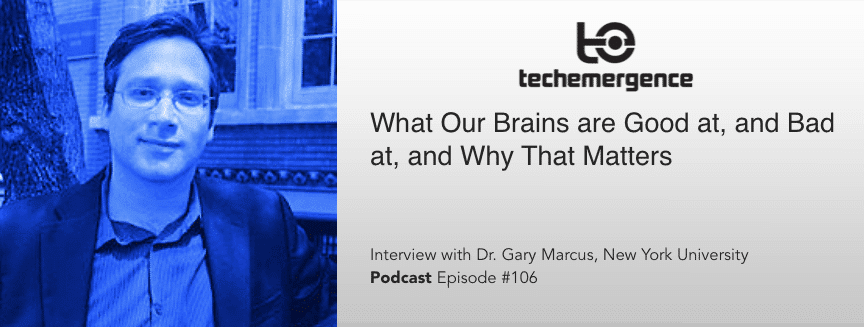
Episode Summary: The brain that we have is suited to our past, not our present – and is the (sometimes unfortunate) result of evolution stumbling forward for hundreds of thousands of years. In this episode, we aim to make sense of and deal with it. Dr. Gary Marcus shares his insight as to what the brain is good and bad at, and why – in addition to what this might imply for the future of human enhancement.
Guest: Dr. Gary Marcus
Expertise: Neuroscience, Psychology
Recognition in Brief: Author of New York Times Bestsellers Guitar Zero, and Kluge: The Haphazard Evolution of The Human Mind (New York Times Book Review Editors’ Choice). His writing and opinions on artificial intelligence and neuroscience have been featured in publications such as Wired, Discover, The Wall Street Journal, and The New York Times.
Current Affiliations: New York University (Center for Language And Music / Psychology)
The Brain’s Haphazard Construction
A “kluge,” as Dr. Marcus explains, is “an old engineer’s term for a clumsy solution – you can think of MacGyver – duct tape and rubber bands,” and likens the mind to exactly that. “Evolution is not perfect, but makes a local maximum” Gary explains – going on to cite the human spine as an example of an evolved – yet not ideal – solution to upright walking.
In this physical analogs of the lumbering process of evolution, he gives examples of other upright designs of the skeleton that might have been more advantageous, but weren’t accessible to evolution during our development (our spine had to involve small variations of other “all fours” creatures, whose spines spawned from small variations of the spines of early aquatic life). The mind, explains Dr. Marcus, is similar, and our thought processes and mental capacities are a bundle of tweaks and iterations from our less intelligent predecessors. Darwin’s phrase was “descent with modification.”
What we have both physically and mentally is… “good”… but now what you’d create if you designed from scratch. In today’s world, our memory would be better if it were more similar to a computer (placed in one spot that can easily be accessed by going back to that “slot”), what is called “location-addressable memory.” This kind of consistency in “where it’s put” and “where to find it” makes computer memory reliable, while Gary points out that our memory is not even remotely reliable – which in this age of knowledge work might be considered a darn shame.
When Can We “Upgrade”?
Evolution’s own path to improvement might involve hundreds of thousands of years in order to gradually shift our mental capacities to be more of a fit for modern work. However, more likely to see a shift happen sooner “There are ways that we might build nervous system implants where memory is in the implant, where we don’t rewire our own brain, but we build something else that we wire into our brain – which might be a better solution” he says.
Dr. Marcus believes that this extension beyond our present human condition would occur in much less time than the evolutionary process – but that we have a lot more to learn before we start “plugging in” our minds. He mention that while he knows my name is “Dan,” he has no idea where that thought is floating in his brain, and with today’s understanding of the mind, we’d have no ability to retrieve that thought.
As for desired “enhancements,” Dr. Marcus would be interested in improved volition and focus (rather than being relegated to the distract-able mind that we’re stuck with today), and I mention that control over emotions and well-being mind be a desirable future state of our mental affairs – should we be able to alter them. For now we can keep dreaming – or rather – get back to research.







